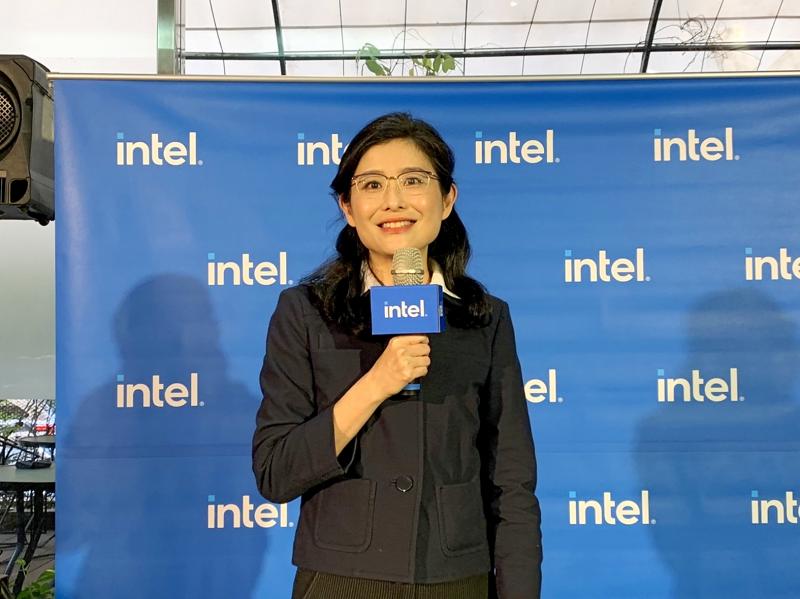Intel Taiwan is to reward employees who recommend female semiconductor talent as part of a global effort by the US-based company to diversify its workforce.
If a recommended female candidate is hired in the company’s IC design or research and development department, the employee who recommended her would receive a bonus of NT$160,000, double that paid for new male employees, Grace Wang (汪佳慧), vice president and general manager of sales and marketing, told local media on Friday.
Intel Taiwan’s “Rise 2030” project aims to double the number of female workers and those coming from multicultural backgrounds in ranking managerial positions, Wang said.

Photo: Vanessa Cho, Taipei Times
The company also aims to raise the percentage of female professionals to 40 percent during the 10-year project, she said.
Worldwide, the percentage of female workers at Intel Corp rose by 0.4 percentage points over the past year to 27.8 percent, while that of ranking female managers grew by 0.8 percentage points to 21.1 percent, she said, adding that female technicians would account for 26 percent by the end of this year, up from 25.2 percent a year ago.
Intel stresses inclusiveness and has a multicultural workforce, Wang said.
Intel Taiwan has also been seeking to hire talent on university campuses across the nation, she said.
In related news, more women are taking supervisory and executive positions in the private sector and government, two reports showed on Tuesday.
There were 374,000 elected officials, business leaders or managers in the nation last year, of whom 114,000, or 30.5 percent, were women, a report by the Directorate-General of Budget, Accounting and Statistics said.
That was 10 percentage points higher than the level in 2010 and the first time the figure surpassed 30 percent, the agency said in its latest national statistics report.
Last year’s figure was lower than the 44.6 percent in the US, but higher than the 15.7 percent in South Korea and 13.3 percent in Japan.
However, the number of women in top positions in Taiwan still remained well short of the 260,000 men who were elected officials, business leaders or managers, the report said.
China Credit Information Service Ltd (中華徵信所), a Taipei-based credit rating services company, also issued a report on the nation’s top 100 business groups, which found that 89.3 percent of the core decision-makers in the top 100 enterprises were men this year.
Of the 845 core decision-makers in those companies, 755 were men, the report said, but added that a growing number of listed companies and public banks have chairwomen at the helm.
Each year, the company selects 100 core enterprise figures, and the number of women on the list rose to 12 this year, up from four in 2017, the report said.
The firm expects the ratio to exceed 15 percent by 2029.

TAKING STOCK: A Taiwanese cookware firm in Vietnam urged customers to assess inventory or place orders early so shipments can reach the US while tariffs are paused Taiwanese businesses in Vietnam are exploring alternatives after the White House imposed a 46 percent import duty on Vietnamese goods, following US President Donald Trump’s announcement of “reciprocal” tariffs on the US’ trading partners. Lo Shih-liang (羅世良), chairman of Brico Industry Co (裕茂工業), a Taiwanese company that manufactures cast iron cookware and stove components in Vietnam, said that more than 40 percent of his business was tied to the US market, describing the constant US policy shifts as an emotional roller coaster. “I work during the day and stay up all night watching the news. I’ve been following US news until 3am

UNCERTAINTY: Innolux activated a stringent supply chain management mechanism, as it did during the COVID-19 pandemic, to ensure optimal inventory levels for customers Flat-panel display makers AUO Corp (友達) and Innolux Corp (群創) yesterday said that about 12 to 20 percent of their display business is at risk of potential US tariffs and that they would relocate production or shipment destinations to mitigate the levies’ effects. US tariffs would have a direct impact of US$200 million on AUO’s revenue, company chairman Paul Peng (彭雙浪) told reporters on the sidelines of the Touch Taiwan trade show in Taipei yesterday. That would make up about 12 percent of the company’s overall revenue. To cope with the tariff uncertainty, AUO plans to allocate its production to manufacturing facilities in

Six years ago, LVMH’s billionaire CEO Bernard Arnault and US President Donald Trump cut the blue ribbon on a factory in rural Texas that would make designer handbags for Louis Vuitton, one of the world’s best-known luxury brands. However, since the high-profile opening, the factory has faced a host of problems limiting production, 11 former Louis Vuitton employees said. The site has consistently ranked among the worst-performing for Louis Vuitton globally, “significantly” underperforming other facilities, said three former Louis Vuitton workers and a senior industry source, who cited internal rankings shared with staff. The plant’s problems — which have not

TARIFF CONCERNS: The chipmaker cited global uncertainty from US tariffs and a weakening economic outlook, but said its Singapore expansion remains on track Vanguard International Semiconductor Corp (世界先進), a foundry service provider specializing in producing power management and display driver chips, yesterday withdrew its full-year revenue projection of moderate growth for this year, as escalating US tariff tensions raised uncertainty and concern about a potential economic recession. The Hsinchu-based chipmaker in February said revenues this year would grow mildly from last year based on improving supply chain inventory levels and market demand. At the time, it also anticipated gradual quarter revenue growth. However, the US’ sweeping tariff policy has upended the industry’s supply chains and weakened economic prospects for the world economy, it said. “Now